Home » Jazz Articles » Interview » Dwayne Burno: Tradition
Dwayne Burno: Tradition
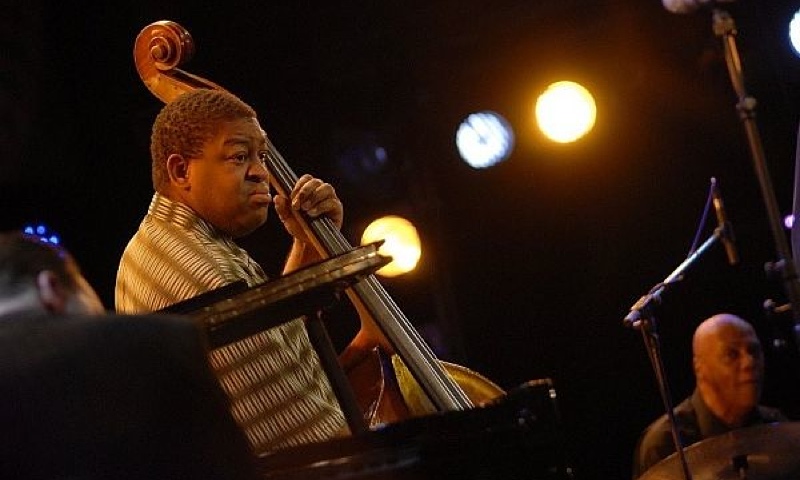
George Colligan
multi-instrumentalistb.1969
Dwayne Burno is one of the great bass players of his generation. Originally from Philadelphia, Burno has been on the New York and international jazz scene since 1990. He has played with so many of the great legends of jazz:

Betty Carter
vocals1929 - 1998

Benny Golson
saxophone, tenor1929 - 2024

Freddie Hubbard
trumpet1938 - 2008

Joe Chambers
drumsb.1942
Burno is passionate about music, opinionated, articulate, and extremely insightful. I got him to do this interview recently and as you will see, he had a lot to say.
George Colligan: What are your earliest musical memories?
Dwayne Burno: My earliest musical memories revolve around my mother and older siblings and phonograph records. My mother, the late Juanita Burno (1935-2001), was an accomplished pianist and choral director from her teens until her life's end. I was likely paying heavy attention to music in uterus. Once I arrived, my mother played services every Sunday with me, seated or laid across her lap while she played. I literally saw the keyboard and the hand-eye coordinated formation of sounds right before my very eyes. My older siblings all played a musical instrument. They all played and continue to play, well. My oldest brother (Jeffrey Bundy, b. 1953-) plays trumpet and can be found playing in local Philadelphia clubs or traveling the globe with such acts as

Billy Paul
vocals1934 - 2016

Nancy Wilson
vocals1937 - 2018

Cannonball Adderley
saxophone1928 - 1975

Jimmy Smith
organ, Hammond B31925 - 2005

Wes Montgomery
guitar1923 - 1968

Ray Charles
piano and vocals1930 - 2004

Ella Fitzgerald
vocals1917 - 1996

Chico Hamilton
drums1921 - 2013

Stan Getz
saxophone, tenor1927 - 1991

J.J. Johnson
trombone1924 - 2001

Duke Ellington
piano1899 - 1974
There was one Columbia Records compilation entitled Jazz Omnibus, which I fell in love with. The cover features a white woman of upper crust, high-brow, dressed in an evening gown with mink stoll, carrying a trombone case in one hand and walking a leashed toy dog in the other, approaching a door which reads "Jam Session Tonite!" The doorman is smiling at her as she sets to enter the club. This compilation has selections from artists that were on the Columbia Records roster in the mid to late 1950's like

Louis Armstrong
trumpet and vocals1901 - 1971

J.J. Johnson
trombone1924 - 2001

Art Blakey
drums1919 - 1990
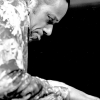 "
data-original-title="" title="">The Jazz Messengers,
"
data-original-title="" title="">The Jazz Messengers, 
Miles Davis
trumpet1926 - 1991

Dave Brubeck
piano1920 - 2012

Paul Desmond
saxophone, alto1924 - 1977

Erroll Garner
piano1921 - 1977

Donald Byrd
trumpet1932 - 2013

Gigi Gryce
saxophone1927 - 1983

John Coltrane
saxophone1926 - 1967

Philly Joe Jones
drums1923 - 1985

Red Garland
piano1923 - 1984

Paul Chambers
bass, acoustic1935 - 1969

Max Roach
drums1925 - 2007

Tommy Flanagan
piano1930 - 2001

Paul Gonsalves
saxophone, tenor1920 - 1974

Julius Watkins
french horn1921 - 1977
Spanky De Brest
bass, acousticb.1937
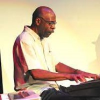
Sam Dockery
piano1929 - 2015

Jackie McLean
saxophone, alto1932 - 2006
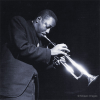
Bill Hardman
trumpet1933 - 1990

Erroll Garner
piano1921 - 1977

Eugene Wright
bass1923 - 2020

Joe Morello
drums1928 - 2011

Paul Desmond
saxophone, alto1924 - 1977
Wendell Marshall
bass, acousticb.1920

Milt Hinton
bass, acoustic1910 - 2000
The other thing that helped along my hearing and listening to the music was my eldest brother, Jeffrey. He had the records of the day because he was checking out trumpet players like Miles, Donald Byrd,

Freddie Hubbard
trumpet1938 - 2008

Woody Shaw
trumpet1944 - 1989

Blue Mitchell
trumpet1930 - 1979

Eddie Henderson
trumpetb.1940
The other thing that made the biggest impression on me was seeing sheet music and making the correlation that there was a system to the notation. I was as quiet as a church mouse as a child but when it came to music, my curiosity and fascination led me to ask many questions. My mother attempted to make a sensible explanation of key signature and time signature to me when I asked but I was much too young to completely grasp the theory behind the rules. I did however come to the realization that music can be written for all to understand, and that some day I would compose music as my form of personal musical expression.
GC: When was the moment you knew you would be a professional musician?
DB: I think music decided that I was going to play it rather than there being a conscious decision of mine. Music is a business I entered with no knowledge of how one's life or time in it is supposed to go. One particular experience as teenager in Philadelphia gave me confidence to believe that I must be proceeding in a correct direction. I had a friendship with an older Philadelphia pianist, Raymond King. I knew him trough my teacher at Overbrook High School,

G. Thomas Allen
vocals
Sabir Mateen
saxophone, tenorb.1951
In one conversation, which led to this particular experience, I expressed to Raymond that I felt I was at a musical standstill. I felt I needed a teacher to continue growing and learning my instrument correctly. I had met with some teachers to discuss lessons but the best was out of my price range and the others frankly didn't measure up as teachers. Raymond called me up and told me he talked to someone on my behalf and I was told to go meet this musician at his gig. The musician I was set to study with was Arthur Harper. Harper was a funny, lovable guy. I showed before the first set of the gig—it was a school night— and we talked. He told me to stick around, he wanted to hear me play and he'd allow me to sit in on the second set. I listened to Harper deal the entire first set. He sounded wonderful. I felt like I was listening to someone play on par with the recordings I heard of

Paul Chambers
bass, acoustic1935 - 1969

Ron Carter
bassb.1937
The band always took a long set break. They left the club to sit in their cars and relax— that's the best way to put it. When the trio returns to play the second set, Harper turns to me and says, "I'll play the first one then you come up." I patiently waited. Something had changed in Harp's demeanor so he began telling me he was going to play another. Then he said," Come back next week." I'd sat there, waiting to play but now I was frustrated and annoyed. Then, the moment of divine intervention arrived. The tune "What is This Thing Called Love" was called. The activities of the long, relaxing break had taken their toll on Harper. He still had good moments but he was sluggish and falling behind. When he heard the speed of the tempo, he frantically motioned for me to get up and play. I actually finished out the rest of the night. The others on the gig in the rhythm section were organist/pianist—playing only piano—Shirley Scott and drummer

Mickey Roker
drums1932 - 2017
GC: Did you do more practicing or listening when you were younger? Do you think playing is as important as practicing? Why or why not?
DB: I didn't begin playing double bass until I was a high school junior. When I jumped in the pool, I felt like I was behind and needed to catch up. I felt I had a good foundation in terms of listening. I had a variety of resources at my avail. I had my mother's collection of vinyl—minus some Duke Ellington albums I'd broken around age five —and my brother Derrick began collecting while away at college so I had access to his collection after he'd bring albums home at semester ends. About age seven, I began collecting jazz, pop, funk and rap albums and singles. I had 16 years of musical listening in my ears and soul and consciousness before I played a note on bass. I had been listening to jazz from birth but I also had learned how to listen, feel, and appreciate many of the other divisions of music.
I practiced in a focused but random manner. I was self-taught on bass as a result of the manner in which the instrument made its way into my musical life. I had studied violin from fourth grade through the completion of high school. I never felt the instrument was spiritually or physically for me but my mother wouldn't allow me to quit and I became more than quite proficient at it.
In my junior year of high school, I was approached by a wise man, the head of the Music and Art Magnet programs, Dr. George E. Allen. He looked into my personality and knew my interest, knowledge and love for jazz as well as the depth of my talent. Though it made absolutely no sense to me at the time, it made perfect sense for him to give me an acoustic bass and tell me to learn it and join the jazz quintet. The program had two freshmen [that] didn't know their instruments or music well enough to jump into making the school's quintet happen right away. I didn't know a thing about double bass other than the fact it was the lowest pitched member of the family of string instruments and it was strung in intervals of perfect fourths. What made me a "go" with my teacher was he knew the speed I could grasp anything musical. Consequently, when my teacher handed off the instrument, he also gave me a tune list to learn so we'd have a full repertoire as a band. I was given two weeks to get it together before our first gig. As a working unit, we played numerous professional gigs. I was earning a better than average wage not only were we earning money but we were learning lessons for our futures. My teacher also taught us things like being early to places to set up and to tip waitpersons—I digress.
The summer before I entered Berklee College of Music [in] 1988, I altered my regular summer routine, much to my mother's dislike. I had worked a city sponsored summer job since age 14 and this kept money in my pocket and kept me out of the house. I knew I was entering a new frontier based on the level of success spurned and spawned at Berklee. I had already made gigs with alums like

Wallace Roney
trumpet1960 - 2020

Donald Harrison
saxophone, altob.1960
Back to practicing and the summer of '88. I geared up for what I figured would be my greatest musical challenge to date in my life. I had only been playing my instrument for two full years at the point of entering college. I knew folks that had been on their instruments for over ten years and sounded like it. I felt like a babe in the woods and a deer in the headlights.
More things helped. My first day/night in Boston after moving into 98 Hemenway—the all- male dorm off Berklee's campus—I met my roommate, tenor saxophonist

Seamus Blake
saxophoneb.1970

Geoffrey Keezer
keyboardsb.1970

Chris Cheek
saxophoneb.1968

Roy Hargrove
trumpet1969 - 2018

Branford Marsalis
saxophoneb.1960
I had the good fortune of knowing

Peter Washington
bassb.1964

Bobby Timmons
piano1935 - 1974

Albert Tootie Heath
drums1935 - 2024
Practicing is vital in a young musician's formative stages of growth and development. While in attendance of Berklee College of Music for my three full semesters there, I had my bass in my hands on a daily basis on average of 13 hours, per day. I was forced to develop my ears and eyes with sight reading in every new situation and new sonorities each new composer introduced. Once you begin working as a musician, your focus on practicing diminishes. You're concerned about sleeping, making enough money to afford where you live, food for your sustenance, and honoring and handling your commitments to work as a musician via rehearsals and recordings. Then add in dating and you're making more time for your paramour and trying to balance your schedule with their schedule and your feelings with their feelings. It comes to virtually a complete halt if you go for the brass ring of starting a family.
The only folks that succeed in practicing are those who make a conscious decision to be completely selfish in their musical dedication. Usually, their other relationships suffer from the selfishness. Get it in while you're young, unfettered, free and single because if your family means as much to you as it does me, then I gladly accept the diminishment of my practice time. The problem or my biggest pet peeve I have with most bass players today is their overzealousness to be thought of as a soloist with ever giving enough care, detail, and concern to their real and true task at hand; harmonically underpinning the band while swinging the band, ad infinitum. It's bass players everywhere. I see it here in America. I see it all throughout Europe, South America, Central America, Asia, and Scandinavia. Bass players just rip roaring ready to go, begin their solos in thumb position and solo on every tune. You don't get the gold watch for great solos.
GC: What gigs or apprenticeships were most valuable to you as an up and coming musician? Do you think there are still possibilities for apprenticeships in jazz nowadays?
DB: Every apprenticeship or hiring was valuable to me. I learned everything from minutia to major in scale and detail. I was fortunate enough to have played with the last bastion of true masters and innovators. My career was never indebted so much to the '90's hype of the Young Liars movement. The young person in generations after me can't say they met, heard, knew, or played with

Clifford Jordan
saxophone, tenor1931 - 1993

Idrees Sulieman
trumpetb.1923

Art Taylor
drums1929 - 1995

Harold Vick
saxophone, tenorb.1936

Christopher Hollyday
saxophoneb.1970
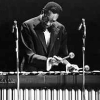
Milt Jackson
vibraphone1923 - 1999

Tommy Flanagan
piano1930 - 2001

Hank Jones
piano1918 - 2010

Roy Haynes
drums1926 - 2024

Junior Cook
saxophone1934 - 1992

Ronnie Mathews
piano1935 - 2008

Joe Chambers
drumsb.1942
When I was coming up, I and my peers wanted to play with the older guys, earn their respect, get the nod from them or the encouraging words that maybe you were headed the right way or on to something or also get the straight brutal honesty that there was something wrong in your sound, articulation, the changes you played, the weight or length of your beat. The older guys weren't afraid to tell it like it is or to put it right because even if some of it was coming from anger or insecurity or prejudice, it truly came from a place of perpetuating and fostering growth and development in terms of the music and having the music played and treated correctly. There is no deference between the generations. Today, these piece of shit young mother fuckers who've never changed a light fucking bulb or wiped their own musical ass try to talk to me like we're equals. The fucking, unmitigated gall! My feeling is that the moment these youngsters decide they truly want this music as their focus and conclusion rather than as an afterthought and really want to play it, learn how to make it well and make people feel good and get to swinging, will be the moment they are ready to learn from those of us that still can and do. As a generation lumped together as a whole, they seem to have no collective interest in being humble, shutting the fuck up and wanting to actually learn. Most of them seem to suffer from know-it-all syndrome or this collective nonchalance or they keep searching for this easy button, which we all know does not exist.
GC: Do you have a philosophy of "the role of the bassist in a jazz group?" Do you think a musician should be more concerned with blending with the band? Or working their style into the band? Or both?
DB: I believe you have a sound that has many components and many things that challenge it's production every time you play your instrument. You have your own physically manufactured components of your sound like consistency, attack, nuance, inflection, the inherent instrumental sound qualities and nuances, theoretical and intellectual qualities, and properties that govern the mental aspects of your sonic production. If you tie them all together and you can only play that what projects from the instrument feels and sounds good, clean, clear, intelligent, logical, meaningful, and emotionally relevant. If your physical, mental stamina, focus or clarity are not up to par while your instrument is in hand, what you produce likely will not feel and sound good to you so the chances are just as certain that to an educated listener, your flaws will be noticeable. The regular layperson with nothing more than a slight sense of musicality or artistic taste or appreciation might not discern anything.
Tags
Dwayne Burno
Interview
George Colligan
United States
Philadelphia
Betty Carter
benny golson
Freddie Hubbard
Joe Chambers
Billy Paul
Nancy Wilson
Julian "Cannonball" Adderley
Jimmy Smith
Wes Montgomery
Ray Charles
Ella Fitzgerald
Chico Hamilton
Stan Getz
J.J. Johnson
duke ellington
Louis Armstrong
J.J. Johnson
Art Blakey
The Jazz Messengers
Miles Davis
Dave Brubeck
Paul Desmond
Erroll Garner
Donald Byrd
Gigi Gryce
John Coltrane
Philly Joe Jones
Red Garland
Paul Chambers
Max Roach
Tommy Flanagan
Paul Gonsalves
Julius Watkins
Spanky De Brest
Sam Dockery
Jackie McLean
Bill Hardman
Erroll Garner
Eugene Wright
Joe Morello
Paul Desmond
Wendell Marshall
Milt Hinton
Woody Shaw
Blue Mitchell
Eddie Henderson
Dr. George Allen
Sabir Mateen
Paul Chambers
Ron Carter
Mickey Roker
Wallace Roney
Donald Harrison
Seamus Blake
Geoffrey Keezer
Chris Cheek
Roy Hargrove
Branford Marsalis
Peter Washington
Bobby Timmons
Albert "Tootie" Heath
Clifford Jordan
Idrees Sulieman
Harold Vick
Christopher Hollyday
Barry Harris
Milt Jackson
Hank Jones
Roy Haynes
Junior Cook
Ronnie Mathews
Cedar Walton
Hank Jones
Kenny Barron
Johnny O'Neal
Buster Williams
Bill Lee
Jymie Merritt
lee morgan
Billy Higgins
Bob Cranshaw
Shirley Horn
Charles Ables
Burt Bacharach
Antonio Carlos Jobim
Luiz Bonfa
Sergio Mendes
Ivan Lins
Milton Nascimento
Kenny Dorham
Wayne Shorter
Myron Walden
David Hazeltine
Alex Norris
John Swana
Kurt Rosenwinkel
Ben Monder
James Austin
Comments
PREVIOUS / NEXT
Support All About Jazz
 All About Jazz has been a pillar of jazz since 1995, championing it as an art form and, more importantly, supporting the musicians who make it. Our enduring commitment has made "AAJ" one of the most culturally important websites of its kind, read by hundreds of thousands of fans, musicians and industry figures every month.
All About Jazz has been a pillar of jazz since 1995, championing it as an art form and, more importantly, supporting the musicians who make it. Our enduring commitment has made "AAJ" one of the most culturally important websites of its kind, read by hundreds of thousands of fans, musicians and industry figures every month.




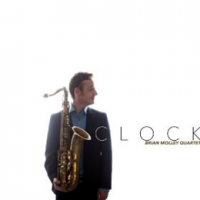




 Buy Now
Buy Now




















